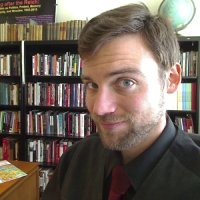Demolition on Karl Marx Square: Cultural Barbarism and the People’s State in 1968
It has been presumed that East Germans were passive after their failed 1953 Uprising. More recent scholarship has even claimed that they enjoyed a People’s State, in which Communist leaders sought to satisfy their everyday needs. Demshuk applies extensive archival research to position the 1968 demolition of Leipzig’s intact medieval University Church as an essential turning point in relations between Communist authorities and the often outspoken people they claimed to serve. The largest East German protest between 1953 and 1989, this intimate story clarifies how the “dictatorial” system operated and lost public belief.
Andrew Demshuk joined the American University history department in Fall 2016. He graduated from the University of Illinois (Champaign-Urbana) in 2010. Thanks to a DAAD fellowship, he published The Lost German East: Forced Migration and the Politics of Memory, 1945-1970 with Cambridge University Press in 2012. Through an Alexander von Humboldt fellowship in 2014/2015, he published Demolition on Karl Marx Square: Cultural Barbarism and the People’s State in 1968 with Oxford University Press in 2017. Currently under review, his third monograph compares urban planning in Frankfurt/Main, Leipzig, and Wrocław: three cities that had been part of Germany before World War II and were rebuilt under three competing Cold War regime ideologies.
The Washington History Seminar is co-chaired by Eric Arnesen (George Washington University) and Philippa Strum (Woodrow Wilson Center) and is sponsored jointly by the National History Center of the American Historical Association and the Wilson Center's History and Public Policy Program. It meets weekly during the academic year. The seminar thanks the Society for Historians of American Foreign Relations and the George Washington University History Department for their support.
Speaker

Moderators

Professor of History, The George Washington University. Director, National History Center of the American Historical Association.

Former Director, Division of United States Studies, Woodrow Wilson Center
Hosted By

History and Public Policy Program
A leader in making key foreign policy records accessible and fostering informed scholarship, analysis, and discussion on international affairs, past and present. Read more
